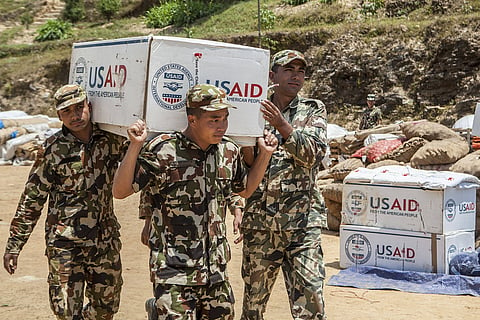Jayati Ghosh on the USAID shocker and the politics of foreign aid: State of Southasia #19
In January this year, soon after taking over as president of the United States for the second time, Donald Trump announced a suspension of all programmes of the United States Agency for International Development (USAID), pending review. Six weeks later, the United States government announced that it was shutting down 83 percent of those programmes, which it perceived as antithetical to the interests of the country.
The move has had profound impacts across the world. For more than 60 years, USAID provided financial assistance to various governments and non-governmental organisations in developing and least developed economies for humanitarian aid – addressing food shortages, plugging gaps in healthcare services, aiding literacy and providing disaster relief. USAID has long been a tool through which the Unites States has exerted its soft power in hundreds of countries.
The development economist Jayati Ghosh points out that USAID, like a lot of foreign aid, has often been offered with strings attached, with donor countries using it to impose conditions or dictate policy to recipient countries. But foreign aid, especially USAID, has also helped marginalised communities ignored by their own governments and people. The impact of USAID withdrawal from Southasia has been swift and dramatic with several programmes shutting down in India, Nepal, Bhutan and Bangladesh. The worst affected country is possibly Afghanistan, which has been in crisis largely due to US policy and action.
Ghosh says that abrupt, cruel cutting off of USAID without a timeline for its withdrawal was designed to create instability and chaos in recipient countries, including in Southasia. In this episode of State of Southasia, she speaks to Nayantara Narayanan about the politics of foreign aid in general, the sudden withdrawal of USAID, and how Southasia can move beyond aid dependency.
State of Southasia releases a new interview every two weeks.
This podcast is now available on Spotify, Apple podcasts and YouTube.
Episode notes:
Jayati Ghosh’s recommendations:
Aid As Imperialism - Teresa Hayter (non-fiction)
The Self-Deception Trap: Exploring the Economic Dimensions of Charity Dependency with Africa-Europe Relations - Carlos Lopez (non-fiction)
Perilous Passage: Mankind and the Global Ascendancy of Capital - Amiya Kumar Bagchi (non-fiction)
Tax Wars - Hege Dehli and Xavier Harel (documentary film)
Further reading from Himal’s archives:
Trump’s approach to Southasia bolsters China’s regional sway
A Rohingya photographer’s dispatch on food-aid cuts in the refugee camps
Neoliberalism, foreign aid and trade unions in Nepal
How Thailand and India continue to fail Myanmar refugees
Sign up for Himal’s newsletters here to get updates on our latest podcasts.

